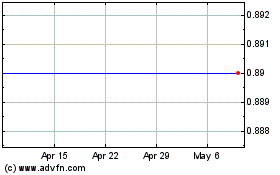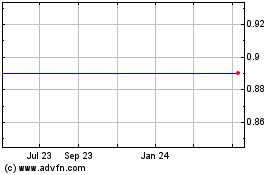OncoMed Announces Early Clinical Data for anti-TIGIT Antibody
November 09 2018 - 8:00AM

Phase 1a Dose-Escalation Data
Demonstrates a Favorable Safety Profile and Signals of Immune Cell
Modulation in Patients with Late Stage Solid Tumors
OncoMed Pharmaceuticals, Inc. (NASDAQ: OMED), a clinical-stage
biopharmaceutical company focused on discovering and developing
novel anti-cancer therapeutics, today announced initial results
from the Phase 1a dose escalation portion of a Phase 1a/b trial of
etigilimab, the company’s anti-TIGIT antibody. TIGIT (T-cell
immunoreceptor with Ig and ITIM domains) is a next generation
checkpoint receptor shown to block T-cell activation and the body’s
natural anti-cancer immune response. OncoMed’s anti-TIGIT
checkpoint inhibitor candidate is an IgG1 monoclonal antibody which
binds to the human TIGIT receptor on T-cells with a goal of
improving the activation and effectiveness of T-cell and NK cell
tumor-killing activity. The data were presented today at the
Society for Immunotherapy of Cancer meeting taking place in
Washington, D.C.
The initial results from the Phase 1a dose escalation portion of
the Phase 1a/b trial included data from 18 patients with a variety
of late stage metastatic cancers including colorectal, endometrial,
pancreatic, among others, who were treated with etigilimab at doses
ranging from 0.3 to 20 mg/kg every other week. There were no
dose-limiting toxicities through the 20 mg/kg every other week
dose. In this “all comers” difficult-to-treat patient
population, stable disease was observed in 7 (38.9%) patients with
prolonged disease control seen in some patients with the longest
durations of stable disease being 205 and 225 days. Of the
remaining 11 patients in the study, ten patients had progressive
disease, and one patient did not meet criteria to be evaluated for
efficacy. The most frequent treatment-related adverse events were
rash (27.8%), fatigue (16.7%), nausea (16.7%), pruritus (16.7%),
and cough (11.1%). Immune-related adverse events, signaling immune
activation included rash (27.8%), pruritus (16.7%), autoimmune
hepatitis (5.6%) and stomatitis (5.6%). Grade 3 or higher
treatment-related AEs included rash (16.7%), and abdominal pain,
embolism, hypertension, and pulmonary embolism (11.1% each).
Biomarker analysis demonstrated a significant reduction of
peripheral T regulatory cells (Tregs), most significant at doses ≥
10 mg/kg, and signals of immune activation. These results are
consistent with preclinical studies with a surrogate anti-TIGIT
antibody and suggest select immune cell depletion and activation of
T cell signaling in patients treated with the drug.
“These data indicate that etigilimab was well-tolerated by
patients and showed modulation of specific subsets of peripheral T
cells,” said John Lewicki, Ph.D., President and Chief Executive
Officer of OncoMed. “The decrease in peripheral Tregs and
observations of stable disease in certain patients are consistent
with the expected mechanisms of our IgG1 anti-TIGIT antibody.”
The company is currently enrolling a single agent Phase 1a
expansion cohort in select tumor types. Concurrently, the company
is also enrolling the phase 1b portion of the trial where
escalating doses of etigilimab are given in combination with
nivolumab in the treatment of patients with solid tumors who have
progressed after treatment with anti-PD1 or anti-PD-L1. The trial
will define a dosing regimen that could provide the basis for
expanded studies of etigilimab in combination with anti-PD1.
About TIGIT TIGIT and its ligands, PVR and
PVR-L2 comprise a novel immune checkpoint which blocks T-cells from
attacking tumor cells and is similar in structure and function to
the inhibitory protein PD-1. OncoMed's anti-TIGIT antibody
(etigilimab) is intended to activate the immune system through
multiple mechanisms and to enable anti-tumor activity. At the 2018
AACR Annual Meeting, OncoMed presented preclinical data (Abstract
5627) which demonstrated that anti-TIGIT treatment reduced the
abundance of Tregs within tumors in animal models. Mechanistic
studies demonstrated an important contribution of effector function
for anti-tumor efficacy. Using a surrogate anti-TIGIT antibody,
potent single-agent dose-dependent anti-tumor efficacy was
demonstrated on large established CT26 WT tumors and in other
models. Anti-TIGIT efficacy was shown to require effector function
for tumor growth inhibition and biomarker analysis demonstrated
reduction of Treg frequency and activation of T-cells and NK cells
as part of the mechanism of action of anti-TIGIT. Additionally in a
human tissue study, TIGIT expression on Tregs was found to be
considerably higher than on CD8+ T-cells in multiplexed IHC panels
across a panel of multiple solid tumors types. This program is part
of OncoMed's collaboration with Celgene.
About OncoMed Pharmaceuticals OncoMed
Pharmaceuticals is a clinical-stage biopharmaceutical company
focused on discovering and developing novel anti-cancer
therapeutics. OncoMed has internally discovered a broad pipeline of
investigational drugs intended to address the fundamental biology
driving cancer's growth, resistance, recurrence and metastasis.
Product candidates in OncoMed’s portfolio include navicixizumab
(anti-DLL4/VEGF bispecific, OMP-305B83), etigilimab (anti-TIGIT,
OMP-313M32), and GITRL-Fc (OMP-336B11). OncoMed also continues to
pursue new drug discovery research. For further information about
OncoMed Pharmaceuticals, please see www.oncomed.com.
Forward Looking Statements To the extent that
statements contained in this press release are not descriptions of
historical facts regarding OncoMed Pharmaceuticals, they are
forward-looking statements reflecting the current beliefs and
expectations of management made pursuant to the safe harbor
provisions of the Private Securities Litigation Reform Act of 1995,
including, without limitation, OncoMed’s intentions and
expectations regarding the anti-tumor and immune-modulating
activity of etigilimab; the ability of etigilimab to improve the
activation and effectiveness of T-cell and NK cell tumor-killing
activity; the safety and tolerability of etigilimab; and the
continued clinical investigation of etigilimab, including the
continued enrollment of patients in the current etigilimab clinical
trial and the potential for expanded studies of etigilimab in
combination with anti-PD1. Such forward-looking statements involve
substantial risks and uncertainties that could cause OncoMed's
clinical development programs, future results, performance or
achievements to differ significantly from those expressed or
implied by the forward-looking statements. Such risks and
uncertainties include, among others, the uncertainties inherent in
the preclinical and clinical development process; OncoMed's ability
to raise additional capital to support the development of its
unpartnered programs; and OncoMed's dependence on its key
executives. OncoMed undertakes no obligation to update or revise
any forward-looking statements. For a further description of the
risks and uncertainties that could cause actual results to differ
from those expressed in these forward-looking statements, as well
as risks relating to OncoMed's business in general, see OncoMed's
Annual Report on Form 10-K filed with the U.S. Securities and
Exchange Commission (SEC) on March 9, 2018, OncoMed’s Quarterly
Report on Form 10-Q filed with the SEC on November 1, 2018, and
OncoMed's other current and periodic reports filed with the
SEC.
Contacts:
Sylvia Wheeler Sylvia.wheeler@oncomed.com
Alex Santos
asantos@wheelhouselsa.com
ONCOMED PHARMACEUTICALS INC (NASDAQ:OMED)
Historical Stock Chart
From Mar 2024 to Apr 2024

ONCOMED PHARMACEUTICALS INC (NASDAQ:OMED)
Historical Stock Chart
From Apr 2023 to Apr 2024
